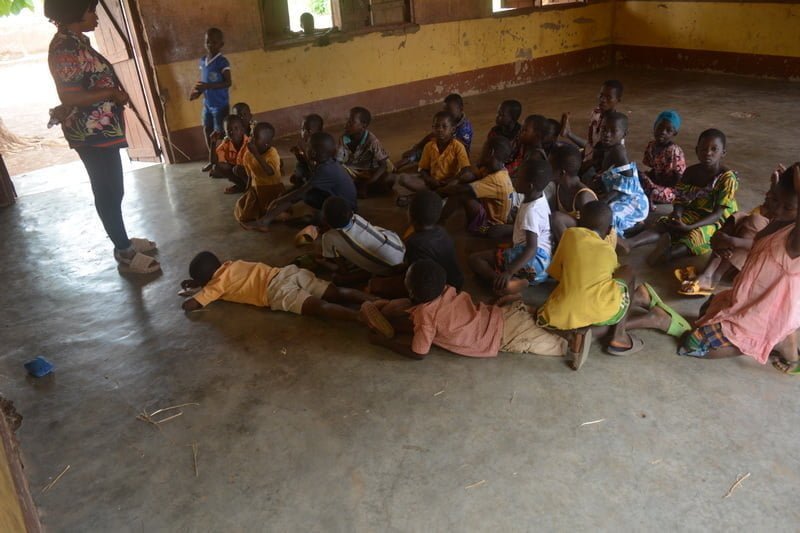Introduction
Ghana’s School of Shame, a documentary made by JoyNews, highlights the dire situation of basic schools in Ghana. The documentary focuses on Bakpaba DA Primary School in the Northern region, where 11-year-old Gifty Odanjo struggles to get furniture for her school. Gifty questions why they have to sit on hard bare floors, sometimes lying on their bellies just to receive an education. The furniture situation at her school is based on a first-come, first-served basis, and pupils improvise by squatting, lying on their bellies, or assuming weird positions on the floor just to learn. Gifty’s tears are a result of the pain of inequalities they have suffered for years. Many, including teachers, assume the children are used to sitting on the floor, but the children are demanding equality.
Actions Taken By The Community
The Ministry of Education Management Information System (EMIS 2021) reports that about 213,252 children lack furniture, and according to the Ministry of Education, about 596,000 KG pupils and 1.28 million pupils in primary schools in Ghana lacked desks in 2021. Community members of Bakpaba came together to implement a project called Citizen-led Educational Accountability and Responsiveness, which aims at getting the community to hold the government accountable. Parents and some community members divided themselves into two groups and debated ways of achieving the objectives. They agreed to write letters to the district assembly to provide them with furniture.
Inadequate classrooms and teachers also affect the learning environment. A headmaster at a nearby school, Joanaayili DA Primary School, is not happy with the situation, and pupils in primary 2 are unable to identify the alphabet. The pupils can recite the alphabet but are unable to point out the letters. The lack of furniture has kept many children at home, and they prefer staying at home to coming to school.
The Director of School for Life, Wedad Sayibu, is not happy with the situation and says that it is sad when children struggle to acquire basic education. In the Northern region, most pupils have only 35% of the trained teachers they need, and about 30% do not have schools nearby. The situation is a lot of injustice. The government needs to take action and address these issues for Ghana’s children to have a decent education.

Ministry of Education’s Response:
Following the release of the documentary, the Ministry of Education responded by acknowledging the dire situation and promising to take action. In a statement, the ministry expressed its commitment to ensuring that every child has access to quality education and acknowledged that the lack of furniture is a critical issue affecting the education of many children in the country.
The ministry promised to immediately provide furniture to schools in dire need and to accelerate efforts to provide furniture to all schools that lack it. The ministry also assured that it will continue to engage with development partners, NGOs, and the private sector to address the furniture deficit.
Conclusion:
The documentary “Ghana’s School of Shame” sheds light on the state of basic education in Ghana, particularly in rural areas. The lack of furniture and basic learning materials such as exercise books and pencils, inadequate classrooms, and shortage of trained teachers are some of the challenges facing public schools in Ghana.
Children are forced to sit on the bare floor, lie on their bellies, or squat just to get an education. The situation has resulted in many children dropping out of school, particularly girls who are more vulnerable to social and cultural pressures.
The documentary has sparked a national conversation about the state of basic education in Ghana and the need for urgent action. The government, NGOs, and development partners must work together to ensure that every child has access to quality education regardless of their socio-economic status or location.
It is time for the government to prioritize education and invest in infrastructure, teacher training, and learning materials. This will not only benefit children but also contribute to the development of the country as a whole. It is a collective responsibility to ensure that no child is left behind.
Follow us on Twitter and Facebook for more content.
JOIN OUR WHATSAPP GROUP
READ ALSO:
Step-by-Step Guide to Applying for Unilever Summer Internships 2023 without IELTS
DAAD Scholarship Application 2023 Roundup: Apply Today!
British (UK) Scholarships in 2023: Study For Free In The United Kingdom.
Apply Now: KNUST Opens Admissions for Undergraduate Top-Up Programmes in 2023
What to Know Before Coming to KNUST: A Guide for Prospective Students.

